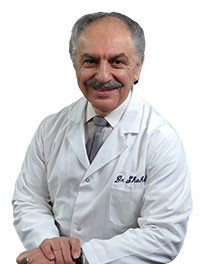Bone Marrow Transplant in Midland Park, NJ
What Is a Bone Marrow Transplant?

Bone marrow is the spongy material inside certain bones in your body that produces stem cells; these cells can differentiate into various new cell types, including red blood cells, white blood cells, and platelets. When bone marrow is damaged, your body cannot produce enough new blood cells, and as a result, your immune system and other major organs do not function properly. This is of particular concern for people with blood cancers like lymphoma and leukemia, or genetic disorders such as sickle cell anemia , who rely on bone marrow to survive.
A bone marrow transplant is a procedure which replaces bone marrow that has been destroyed by illness or disease with healthy stem cells. Transplantation may be used in conjunction with chemotherapy, radiation, or both, in an attempt to eradicate diseased cells before replacing with healthy cells.
While a bone marrow transplant is a serious procedure, for some, it is the only cure for their disease. To schedule an appointment with a healthcare practitioner in Midland Park who specializes in bone marrow transplant procedures, call (201) 806-6099 or contact Dr. M.T. Shahab online.
Reasons for Bone Marrow Transplant
A bone marrow transplant procedure may be needed for any disease which leads to the destruction of bone marrow stem cells, particularly leukemia, lymphoma, aplastic anemia , and sickle cell disease. It can also help to regenerate a new immune system to help fight existing cancers that radiation and chemotherapy failed to destroy. In many instances, chemotherapy and radiation not only kill cancer cells but healthy blood cells too. A bone marrow procedure can be used in these cases to help replace what was lost during treatment.
Additional reasons for bone marrow transplant include:
- Genetic disorders such as thalassemia, hemoglobinopathy, and Hurler syndrome
- Immune system disorders such as severe combined immunodeficiency (SCID) and Wiskott-Aldrich syndrome (WAS)
- Cancers such as breast, testicular, neuroblastoma, and multiple myeloma
Types of Bone Marrow Transplant
There are several different types of bone marrow transplants; the kind of treatment you need will depend on why your stem cells have been damaged in the first place.
Autologous Transplants
An autologous transplant harvests stem cells from your blood before you receive treatment, such as chemotherapy or radiation, that would destroy them. These cells are then frozen and stored until needed for transplant.
Allogenic Transplants
An allogeneic transplant uses stem cells from a donor who is a close genetic match and is needed if you have a condition that has damaged your bone marrow cells. The ideal donor will have blood with the same human leukocyte antigen (HLA) in their white blood cells as you do; this is usually a sibling or someone found through a national bone marrow registry.
Umbilical Cord Blood Transplants
Umbilical cord blood is a special type of allogeneic transplant that obtains stem cells from a newborn's umbilical cord immediately following birth. These stem cells are frozen until needed for transplant. Umbilical cord blood transplants are ideal when there are no close genetic matches; since stem cells in the umbilical cord are immature, a less perfect match between donor and recipient is required.
Bone Marrow Transplant Process
The first step in the bone marrow transplant process is to obtain the stem cells from you or your donor. There are two main ways to collect the stem cells needed for transplant:
- Apheresis: A needle is used to draw peripheral blood stem cells via the arm vein; that blood is then placed into a machine to separate the stem cells from the rest of the blood. The stem cells are set aside for treatment, and the remaining blood is then returned to the donor.
- Bone marrow harvest: Under general anesthesia, a needle is inserted into the soft spot of the hip bone (the marrow) to aspirate the stem cells.
Most likely, you will undergo chemotherapy, possibly with radiation treatment, for about ten days before the transplant. This is done to treat your cancer, destroy any faulty bone marrow, and temporarily suppress your immune system so that your body will accept the new stem cells.
To perform the actual bone marrow transplantation, the stem cells are infused intravenously through a central vein. Once inside your body, the stem cells will undergo engraftment, where they will travel to your bone marrow and, once there, grow into the different blood cells. Engraftment can take up to two to four weeks, and the first signs of the process working is a rise in white blood cell count. Although bone marrow transplant recovery is different for everyone,many patients may spend several weeks in the hospital, taking medications and receiving blood transfusions to support their weak immune system and prevent infections.
Bone Marrow Transplant Side Effects
There are a number of side effects and complications that can arise from a bone marrow transplant procedure, including nausea, chills, low blood pressure, fever, headache, and shortness of breath.
More serious complications of a bone marrow stem cell transplant can include:
- Graft failure
- Anemia
- Infections
- Early menopause
- Nausea, vomiting, or diarrhea
- Internal bleeding, such as in the lungs and brain
- Cataracts, causing clouding in the lens of the eye
- Mucositis, a condition causing inflammation and soreness in the mouth, throat, and stomach
- Graft-versus-host disease (GVHD), in which your immune system attacks the donor stem cells
Is A Bone Marrow Transplant Right for You?
The success of a bone marrow transplant will depend on several factors, including:
- Genetics
- Your age and overall health
- Type and extent of the disease being treated
- Whether the transplant is autologous or allogenic
- Your overall tolerance to the medications used in the procedure
While the benefits of a bone marrow transplant can mean a successful treatment for your illness, the procedure is not for everyone. To speak with a healthcare practitioner who specializes in bone marrow transplantation in Midland Park, call (201) 806-6099 or contact Dr. M.T. Shahab online.
Medwell Orthopedics & Functional Medicine for Men & Women
Address
33 Central AveMidland Park, NJ 07432
(201) 806-6099
www.BergenCountyDoctors.com
Hours
Mon:
8:00 am - 8:00 pm
Tue:
2:00 pm - 7:00 pm
Wed:
8:00 am - 6:30 pm
Thu:
8:00 am - 1:00 pm
Fri:
8:00 am - 6:30 pm
Sat:
9:00 am - 1:00 pm
Sun:
By Appointment Only


